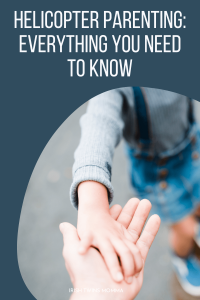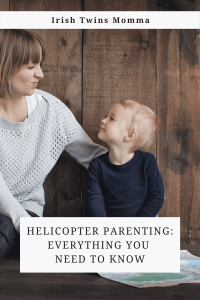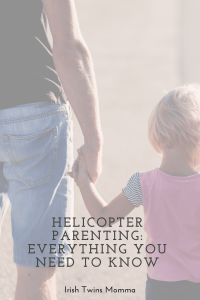This post contains affiliate links. If you click and buy, I may make a commission, at no cost to you. See my disclosure policy for more information.
The term helicopter has a negative connotation, but most parents who get wrapped up in this style of parenting actually have the very best intentions for their children. They want them to succeed, be happy, and live a full life.
Unfortunately, though, in many cases, the negatives of this style of parenting far outweigh the positives. Sure, every parent has a vision for their child’s life and future, and a strong sense of what it takes to achieve that, but studies have shown that children who experience an overcontrolled and overprotective upbringing experience self-doubt and lack confidence, are less able to self-regulate emotions and control impulses, and may even have difficulties when it comes to socialization.

What does helicopter parenting mean?
A helicopter parent is defined as a parent “who pays extremely close attention to a child’s or children’s experiences and problems, [and] are so named because, like helicopters, they ‘hover overhead,’ overseeing every aspect of their child’s life constantly.”
Of course, there is a level of involvement any parent should have in their child’s life; a threshold of guidance that should be available to children through the various stages of life’s milestones, decision-making, and hurdles. The lines can certainly seem blurred between having a healthy amount of say over your child’s life and all of a sudden crossing over into helicopter parenting territory – and having difficulty digging out of it. However, it’s important to learn to chip away at this gray area and decipher between what it means to be a supportive and engaged parent, versus hovering over your child and shadowing their every move.
Most people associate helicopter parenting with older children in middle school and above. You know the type: the parent who determines their child’s social life, or the one who practically does their child’s school project to ensure a good grade. You may be surprised to know that, in fact, helicopter parenting can begin much earlier, and it can manifest in the form of simply being too instructive with your toddler while playing, not allowing them to explore more independently, or overreacting to a small injury on the playground. This form of parenting could have long-term implications, even for the toddler-aged children experiencing it.
Why do we feel the need to helicopter parents?
The answer relies mainly on the parent in question and their own life experiences, but there are certainly key common reasons that many parents become micro-involved in their child’s lives. Parents with the purest intentions basically want what’s best for their child – they want to shield them from the pain of failure and heartbreak, keep them safe and mentally healthy, and maybe even ensure their child is provided opportunities that they themselves didn’t have when they were younger.
Maybe they were neglected by their own parents growing up and are overcompensating now. On the other hand, some parents are competitive and want their children to shine among the rest. Perhaps they think their child’s success is a reflection on them. Some take it even further and live vicariously through their children.
Examples of helicopter parenting
Helicopter parents see themselves as being supportive – as helping their child be successful and productive. When you actually break down the actions that such parents are taking, it becomes clear that they can be harmful.
– Correcting or over-helping toddler during playtime
– Spending every minute of every day with a child (no babysitters or family/friends watching them)
– Completing child’s homework
– Coercing child into playing sports, taking up an instrument, etc.
– Controlling who your child can be friends with
– Co-dependent dynamic with older (including adult-aged) children
Why exactly is helicopter parenting harmful?
While some positivity can come out of helicopter parenting, there are many more downsides to limiting your child’s choices and autonomy.
The primary, longer-term issues are that your child may be unable to operate their life independently, will lack resourcefulness, and will be incapable of adapting and self-regulating emotions, which can be associated with “decreases in social, emotional, and academic functioning from childhood to preadolescence.”
It’s important to note that these effects can stem from your parenting style when your child is just two-years old. This was proven in a study led by Nicole B. Perry, PhD, of the University of Minnesota, who states that “children who cannot regulate their emotions and behavior effectively are more likely to act out in the classroom, to have a harder time making friends, and to struggle in school.”
How can you prevent becoming a helicopter parent?
How do you stop helicopter parenting in its tracks?
How can we identify the changes we have to make without completely stepping away from our parenting duties?
I understand it’s not that easy, but helicopter parenting is a slippery slope and should be addressed.
First, recognize that there’s a problem and identify your reasons for this parenting style – are you trying to impress other parents?
Are you terrified of your child struggling?
Are you trying to make up for the shortcomings in your own childhood?
Are you striving for perfection, both in yourself and in your child?
To take it further, are you doing this for your child…or for yourself?
Then start to implement changes in your thought process as a parent. Avoid worrying about social norms or feeling pressure to adopt the same parenting choices as your friends or the parents of your child’s friends. Stop comparing (comparison truly is the thief of joy!). If you’re feeling an urge to impede or insert yourself in your child’s playtime, social life, school work, or what have you, stop and talk yourself down.
Instead, you should embrace techniques that help to nurture your child’s growth and independence:
– Listen to your child’s wants, needs, and goals and help foster them at home; don’t impose the “you’re the child, I’m the parent, what I say goes” mentality
– Encourage independent play/time; don’t book up their schedule with a million and one activities
– Stop yourself before commenting, criticizing, or offering a suggestion; think to yourself: am I being a helicopter parent?
– Don’t always try to “fix” things; use experiences like getting a bad grade or a social altercation as a learning opportunity and encourage your child to worth through it, come to a resolution, and ultimately face any *appropriate* consequences (getting involved is ok when bullying or anything life-threatening is occurring)
– Avoid excessively monitoring your child’s life (school, social, or professional)
– Exude positivity and encouragement about their life rather than stress and worry; children are sponges and tend to mirror our anxieties
– Allow children to make friends and develop friendships without your opinions; friendships wax and wane and children need to learn how to deal with social challenges
What’s hummingbird parenting?
I suggest looking into ‘hummingbird parenting.’ According to mother.ly, hummingbird parenting is a newer concept known as a “muted version of the helicopter parent.
Hummingbird parents hover but do not interfere too much in the decisions of their children. They remain physically (or psychologically) nearby to jump in if their children need them, but they try to not make decisions for them or prevent their failures.”
This style of parenting fosters a balance between being a hands-off parent vs. a helicopter parent. It allows parents to be in the know and have influence but prevents intervening unless totally necessary. If you’re having trouble breaking from your helicopter parenting tendencies, hummingbird parenting could be a good place to start.
Conclusion
Children need space to grow and learn from their own experiences without their parents constantly intercepting. Helicopter parenting may do more harm than good, and, in the end, your children could even end up resenting you for it. While we want to be there for our children in the best way possible, we cannot intrude and take responsibility for every element and detail of their life. They don’t deserve a puppeteer – what they deserve is a loving, understanding, and nurturing mom.
Sincerely,




Leave a Reply